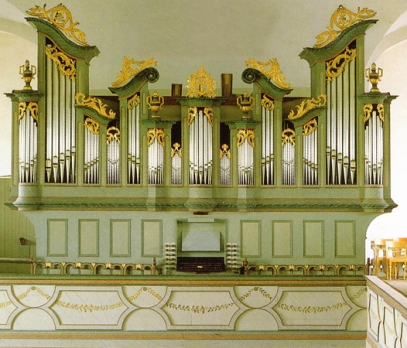

Nieder-Moos, Evangelische Kirche
Johannes Oestreich 1791
State of preservation: Original except for two Mixtur ranks and the higher Cymbel rank. Restoration by Förster & Nicolaus 1978.
The Nieder-Moos organ shows already a changed taste towards neoclassicism and an understanding of the organ based rather on enlightened reasoning than on baroque tradition. All divisions are joined in one common case and hardly separated. Main and side manual only differ in sound and volume contrasts, thereby losing a musical equality of the manuals. The second manual only serves as a reduction at a lower volume level. Playing baroque organ trios demanding a dynamic balance with contrasting sound qualities is thus hardly possible.
The organ case still shows baroque round, tipped and harp pipe fields and acanthus veils, only the vase ornaments and Ionic volutes showing neoclassicist design ideas. Oestreich just adds those pipe fields side by side following an example (Lauterbach 1768) with hardly a proportionate design concept, thus achieving a case with a record number of 15 fields which,however, almost fails to hide the organ case frame, of hardly any esthetically convincing quality. It appears almost logical towards the late 18th century to consider the organ case a design task independent from the organ within.
I Haupt Manual C–f3
Principal 8′
Viol de gam 8′
Quinta Thön 8′
Getakt 8′
Oktav 4′
Flöte 4′
Quinta 3′
Super octav 2′
Cimbel 2′ 2f.
Mixtur 11⁄2 ′
Trompete 8′
II Zweites Clavier C–d 3
Gelind getakt 8′
Flaut travers 8′
Principal 4'
Dui Flöt 4'
Flaschiolet 2′
Quinta 11⁄2 ′
Mixtur 1′ 3f.
Vox humana 8′
Pedal C–g0
Subbass 16′
Octavbass 8′
Violonbass 8′
Posaunenbass
16'
Tremulant (II), coupler II/I
© Greifenberger Institut für Musikinstrumentenkunde | info@greifenberger-institut.de




